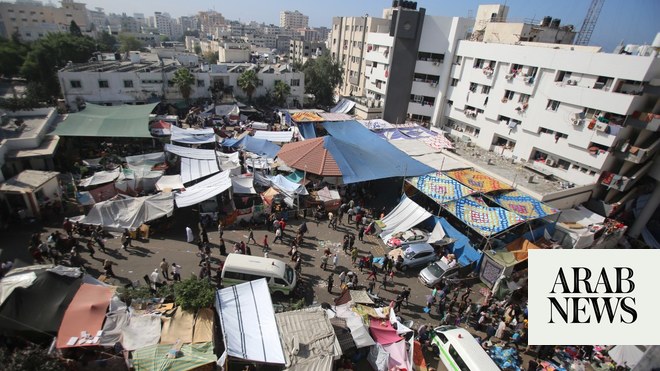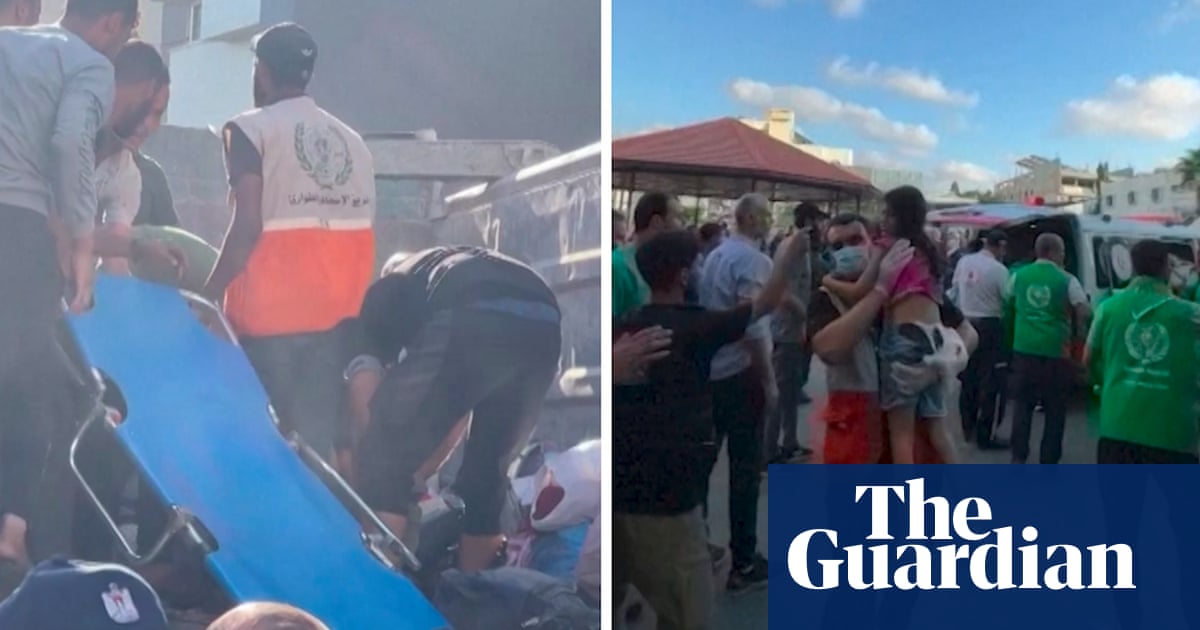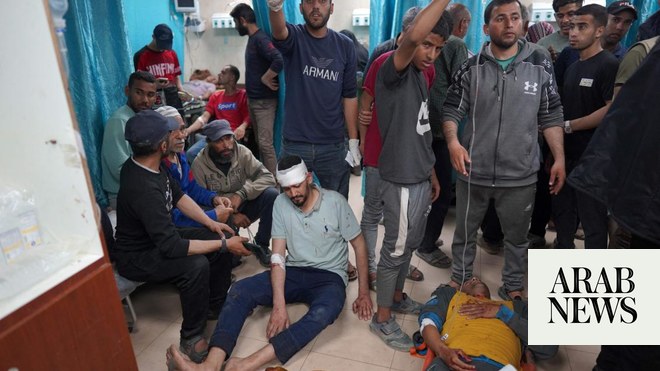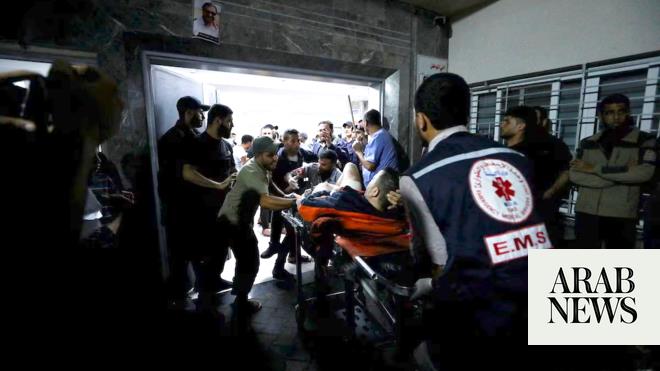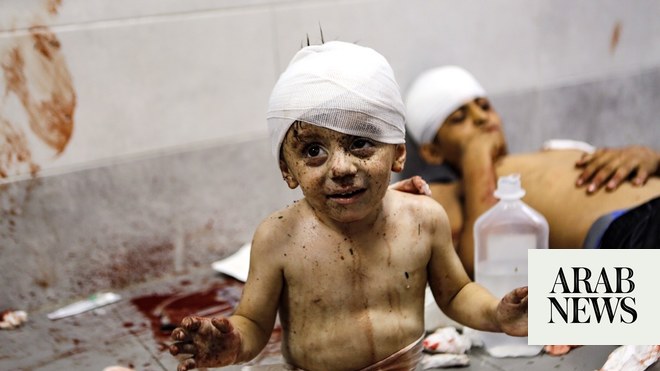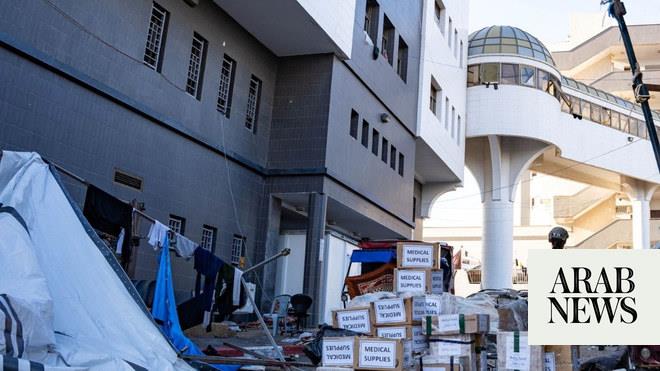
Witnesses to an Israeli air strike and resulting fire at a tent camp in a Gaza hospital compound have shared with the BBC their horror and helplessness at seeing people injured and killed in the flames.
One mother called it “one of the worst scenes we’ve witnessed”, while an injured girl said she heard screaming as people tore down their tent to get them out. A man said he had "broken down" as he was "unable to do anything" to help those who burned to death.
The strike hit the al-Aqsa Hospital compound in Deir al-Balah, central Gaza, in the early hours of Monday, igniting a fire that burned makeshift shelters for displaced people.
At least four people were killed and dozens injured, mostly women and children, according to the Hamas-run health ministry.
The BBC has verified the location of a video that shows what appears to be a person on fire. Other footage captures people rushing to extinguish the flames amid screams and explosions sending fireballs into the night sky.
The Israeli military said it had targeted Hamas fighters operating inside a command centre in the car park, after which a fire broke out "likely due to secondary explosions". The military said the incident was under review.
Charity Doctors without Borders (MSF), which has staff working at al-Aqsa, told the BBC “it had no knowledge“ of a Hamas centre and said “the hospital functions as a hospital”.
The UN"s humanitarian affairs agency said in a statement that “people burned to death” and “atrocities must end”, while a spokesperson for the White House National Security Council called the footage “disturbing”.
"The images and video of what appear to be displaced civilians burning alive following an Israeli air strike are deeply disturbing and we have made our concerns clear to the Israeli government,” the spokesperson told the BBC’s partner CBS.
“Israel has a responsibility to do more to avoid civilian casualties — and what happened here is horrifying, even if Hamas was operating near the hospital in an attempt to use civilians as human shields.”
It hit an area between buildings filled with makeshift shelters, next to an outdoor outpatient waiting area that had no one there at night, Anna Halford, MSF"s emergency coordinator in Gaza who was not at the hospital during the strike, said in a phone call from Deir al-Balah.
Hiba Radi, a mother who was living in a tent behind the hospital, told a BBC freelancer in Gaza she woke up to the sound of “explosions and fires erupting around the tents”.
“There were explosions everywhere, and we were shocked at whether this was gas or weapons,” she said.
“This is one of the worst scenes we"ve witnessed and lived through," she added. "We’ve never seen destruction like this before. It’s hard, really hard.”
Atia Darwish, a photographer who recorded some of the verified videos, told the BBC it was a “big shock” and he was “unable to do anything” watching people burn.
“I was so broken down,” he said.
Um Yaser Abdel Hamid Daher, who also lives at the hospital, told the BBC “we"ve seen so many people burning that we started feeling like we might burn like them”.
The injured included her son, and his wife and children. Her granddaughter Lina, 11, who had shrapnel in her hand and leg injuries, said she had heard people screaming.
”Our neighbor’s daughter was injured in her head and her dad was killed. And our other neighbors were killed. The people next to us tore down the tent to get us out,” she said.
Her grandmother said the family “lost their tent and everything they had; they have nothing left”.
The health ministry reported on Monday that more than 40 people were injured and four killed.
MSF on Tuesday shared a higher toll, saying five people had died, their bodies burned by the time they were recovered, and 65 injured.
Forty of the injured — 22 men, eight women and 10 children — stayed at al-Aqsa. The others were transferred to different hospitals, with eight going to a specialist burns unit.
Ms Halford said her colleagues were treating burns victims ”who will almost certainly not survive", saying “there is very little you can do for burn victims of that severity”.
“You come home with the smell of it on your clothes. It"s a viscerally affecting experience. It stays with you,” she said.
Monday’s strike was the seventh on the hospital site since March, and the third in two weeks, Ms Halford said.
When she arrived at the hospital after the most recent hit, she said she found people picking through twisted metal and burned debris to salvage any belongings.
Another mother the BBC spoke to whose children suffered burns injuries had already evacuated from north Gaza — and now has nothing.
The acting chief of the UN’s Office for the Coordination of Humanitarian Affairs said the strike occurred in an area where north Gaza residents had been told to relocate.
“There really is no safe place in Gaza for people to go,” the statement read. — BBC




